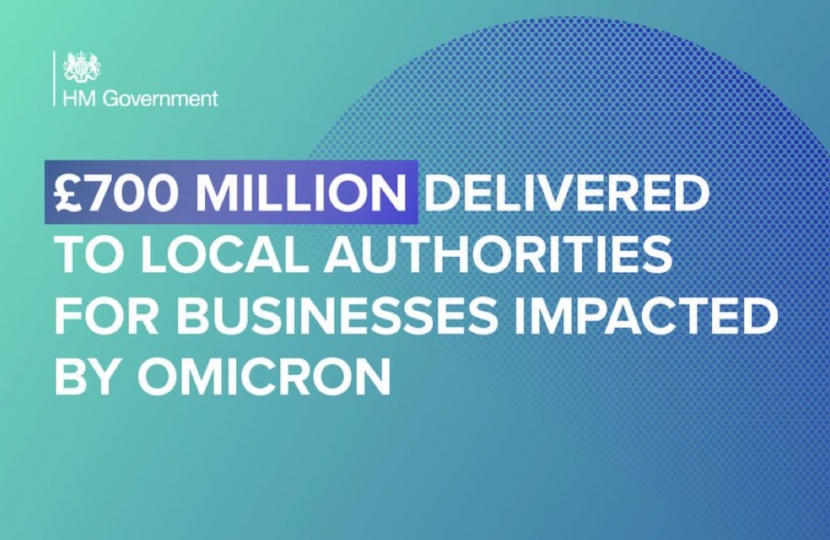
On Thursday the Prime Minister made a statement in the House of Commons on the Omicron variant and our measures to contain the virus, fortify our NHS and keep our country open.
Although it is now clear that Omicron is milder than the Delta variant, we know the variant is spreading quickly. There is a risk that the rapid rise in hospital admissions will continue to increase the pressures on our NHS. That is why we will keep Plan B in place for another three weeks and continue to bolster our defences against the virus with our booster programme – with more than 34 million people now boosted. We have also announced we are:
- Simplifying international travel by removing the need for a pre-departure test and lifting the requirement to self-isolate on arrival until receipt of a PCR for fully vaccinated travellers, returning to the requirement of a lateral flow test no later than day two of arrival.
- Suspending the need to take a confirmatory PCR to confirm the result of a positive lateral flow test - with lateral flow results to be reported online and self-isolation to begin immediately.
The best way to save lives, reduce the pressure on our NHS and keep our country open is to get your jabs - we continue to urge everyone to get boosted now.
Businesses Most Impacted by Omicron Variant To Benefit From Over £700 Million as Government Delivers Funding to Local Authorities
On Friday the Government delivered over £700 million to local authorities for grants to businesses most affected by the spread of Omicron, protecting jobs and livelihoods.
The spread of the Omicron variant presents new challenges for our hospitality, leisure and cultural sectors, as people exercise caution during what is usually their busiest part of the year. That is why the Government has delivered £737 million to local councils as part of our £1 billion package of support for business, so that councils can deliver targeted grants worth up to £6,000 each to hospitality and leisure businesses and discretionary funding to other businesses affected by the Omicron surge.
Firms in the hospitality, leisure and accommodation sectors, many of which have seen a decline in footfall and increased cancellations due to the Omicron variant, will be able to apply for one-off grants of up to £6,000 per premises depending on rateable value:
- businesses with a rateable value of £51,000 or above: £6,000
- businesses with a rateable value between £15,000 and £51,000: £4,000
- businesses with a rateable value of £15,000 or below: £2,667
In addition, more than £100 million worth of discretionary funding is also being made available for local authorities to support other businesses.
While the support package will help to cover costs and protect jobs, the best thing we can do to support businesses is to get the virus under control – which is why the Government continue to urge everyone to get boosted now.
Businesses are encouraged to apply to their council for grant funding which will be administered over the coming weeks. You can view Castle Point Borough Council’s COVID-19 related information and advice for businesses at: https://www.castlepoint.gov.uk/information-and-advice-for-businesses.
Businesses eligible for grants are those that offer in-person services, where the main service and activity takes place in a fixed rate-paying premises, in the hospitality, leisure and accommodation sectors. For example, this includes businesses whose main function is providing a venue for the consumption and sale of food and drink, those that provide facilities linked to recreation and entertainment, as well as businesses whose main premise is used for holiday accommodation.
The Government has chosen to provide generous grants that are the same size as the monthly cash grants provided to hospitality businesses when they were fully closed earlier this year – despite businesses now being still able to trade.
Other businesses impacted by Omicron, such as those that supply the hospitality and leisure sectors as well as personal care services, are also able to apply for grants with the government allocating more than £100 million to the Additional Restrictions Grant (ARG) fund for local authorities in England.
Local authorities will have discretion to allocate this funding to businesses most in need.
For any more information on new grant funding for businesses impacted by the pandemic, including comments from the Business Secretary and the Chancellor of the Exchequer, please visit: https://www.gov.uk/government/news/businesses-most-impacted-by-omicron-variant-to-benefit-from-over-700-million-as-government-delivers-funding-to-local-authorities.
Government takes action to mitigate workforce disruption
As of today, 100,000 critical workers in England will get free daily lateral flow tests, minimising disruption from Omicron and protecting key services.
The high transmissibility levels of Omicron mean business and public services will face disruption in the coming weeks, particularly from higher than normal staff absences. That is why the Government has identified 100,000 critical workers, from food processing to border force, who as of today will receive free lateral flow tests for every working day for an initial period of five weeks. This will make sure that critical workers are not self-isolating unnecessarily and prevent workplace outbreaks.
A number of steps have already been taken to minimise any potential workforce or supply chain disruption, including:reducing the isolation period from 10 to 7 days with 2 negative tests
- introducing daily contact testing to prevent widespread need for self-isolation where someone hasn’t tested positive for COVID-19
- investing over £462 million to support workforce recruitment and retention in the adult social care sector
- using digital staff passports for NHS staff which allow them to move between hospitals easily
- extending the Infection Control Fund until March 2022 to support staff self-isolation payments, testing and covering the costs of staff vaccination in care homes, supported by £388 million
- boosting the numbers of HGV drivers through quicker testing and skills bootcamps
- asking qualified teachers who are no longer in the profession to sign-up to temporarily fill absences and support schools to remain open in the new term
- adding care worker roles to the Shortage Occupation List to bolster our social care workforce
- working to speed up the registration of overseas nurses to practice in the UK - as a result 800 nurses have been able to register with the Nurse and Midwifery Council this week alone
Regular data is being fed into the Cabinet Office to identify early any potential disruption and take any steps to mitigate them. The contingency planning utilises the New Government Situation Centre and a central taskforce of civil servants based in the Cabinet Office and working across government and with the devolved administrations.
Should disruption occur the Government stands ready to make sure that any necessary burdens to businesses are cut. There is work ongoing to identify potential regulatory, policy or operational changes which could minimise or alleviate potential disruption.
Together with the Plan B measures and our successful vaccine rollout, this will help keep essential services and supply chains running, making sure people can access the services they need. For any more information on the action the Government has taken to mitigate workforce disruption caused by Omicron, including comments from the Chancellor of the Duchy of Lancaster, please visit: https://www.gov.uk/government/news/government-takes-action-to-mitigate-workforce-disruption.
